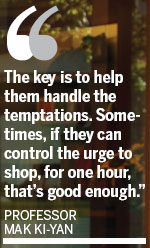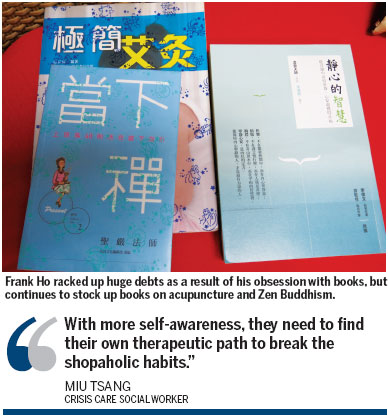Just gotta have it
Updated: 2013-09-06 06:45
By Li Yao(HK Edition)
|
|||||||||
Here in the city that likes to call itself the shopping capital of Asia, people quite naturally like to shop, but for some, shopping is an obsession, an addiction, a soul destroying experience. Li Yao writes.
At an art exhibition last month, five of this year's graduates from the Hong Kong Art School mounted an exhibition of works exploring our obsessions. There could hardly be a representative exhibition about Hong Kong's obsessions without acknowledgement of the obsession to shop, to acquire, to amass an abundance of "stuff" so that sleeping arrangements must be altered to warehouse the properties.
There's Frank Ho. His live-in girlfriend sleeps with his 80-year-old mother. Frank, a modern day "Prometheus Bound," so to speak, sleeps with the books that occupy the other half his bed, if not more. Figuratively, if not literally, books are Frank's security blanket.
His aspiration to knowledge is the eagle clawing at his vitals. By his own account, he never leaves home that he's not carrying a tome, or two or three. At work, he tells China Daily, he keeps at least 20 books in his locker: how to keep in good health, Traditional Chinese Medicine, massage, acupuncture, Zen Buddhism, living in the here and now, the search for inner peace.

"I think my boss knows about this. He would not be happy to see me reading during work hours," Ho admitted. But he says he is not bothered. Books are his refuge and probably always will be.
Over a 20-year period, with the abandon of a pack rat, he accumulated a hoard of magazines and books, so with little forethought, and with his eye fixed on the Empyrean of higher learning, he didn't see the pit where the path was taking him. One day he found himself bound inextricably by debts, and he couldn't manage them. He had amassed debts of more than HK$500,000 on a HK$17,000 a month salary.
He'd stare morosely at his credit card bill when it came, then go out and buy more books. He'd buy a book and set it down somewhere, then forget he'd bought it and go out and buy another copy. He has multiple copies of some books and since he assiduously refuses to lend them, some never have had their covers opened. Some of these artifacts of his obsession have gone moldy, buried so deep in his treasure trove he's lost track. "When I saw these books, I just wanted them. My psychiatrist said it was an obsessive-compulsive disorder," Ho said. He started seeing his psychiatrist 10 years ago. At his first appointment he asked the doctor to give him a pill that might make him oblivious - and beyond thoughts of shopping for books. After some counseling he gave up that idea and chose to go with a "clear mind." He takes acupuncture, meditates and goes sunbathing.
His penchant for escaping into self-help books is a clue to the interior landscape where Franks demons abide and to how he tries to appease them. By an odd coincidence, he can be found on his work days, hoeing and weeding at his job as a landscape gardener at a residential estate. But Frank's story is full of ironies. He traveled his road to ruin whilst employed as a library assistant at a university.
"Other people are very knowledgeable. I know so little. At school, I felt inadequate in my studies and hoped buying books would help. Later, I bought books because my performance at work was not good enough," Ho said.
Ho explains his escape into books started in high school, amid the sturm und drang that tests and seasons us in our youth. He was studying for the Hong Kong Certificate of Education Examination, the exam behind which stood the door to his future, for better or worse. Feeling inadequate and fearing that his future might be "for worse", he started reading in search of the magical key that would open the door to the treasures of supreme knowledge.
His compulsion has never changed. Books are still the balm he applies to soothe his inadequacies.
All for better moods?
Mak Ki-yan, honorary professor at the Department of Psychiatry, the University of Hong Kong, treats shopaholics. Like Ho, they are people who accumulate "things": books, toy models, stuffed dolls, hat pins and road maps. Whatever their obsession, their purchases take over their living space, even the bed. At night, some carefully move part of their treasure trove onto the floor to give themselves enough room to lie down. These acquisitions can be quite voracious when it comes to their appetite for gobbling up living space. One man's wife demanded a divorce.
Women usually abandon themselves to clothing and cosmetics. Some collect the same shoe styles in different colors: a set!! And there's something about completing a "set" that always makes life more fulfilling. "They get satisfaction from the sense of completeness. Owning a complete set makes them proud," Mak said.
Mak described the trials of a woman who came to him after a broken relationship. After the break up the only thing that could ease her pain was shopping, so she acquired the obsession to shop; spent a lot on shoes and clothing. Her family took away her credit card and gave her a debit card, leaving her unfulfilled. What's the fun of being a pay-as-you-go shopaholic? So she tried a shortcut and shoplifted a jar of face cream. She got busted.
Mak wrote a letter to the court, explaining he was treating the woman for depression. The woman vowed to control her obsession, found a new boyfriend, but eventually drifted back into the "shopaholic" life. Her new passion was books.
Mak found that she was bipolar, had mood swings so she'd be bursting with energy one day, and depressed and incapacitated the next. It really didn't make much difference to her obsessions which state she was in. She went shopping anyway.
"The key is to help them handle the temptations. Sometimes, if they can control the urge to shop for one hour, that's good enough," Mak said.
That's not easy for shopaholics. They can walk into a store, buy something and 15 minutes later the hunger to buy "something new" is gnawing at them again.
"I suggest to them that they criticize each item, find fault with it, until they have found the perfect one," Mak explained. When a salesperson says an item is the last one, the shopaholic may be encouraged to think that the better ones have already been sold and the remaining one must be defective. This line helps many shopaholics. They like to think of themselves as having higher standards.
Getting shopaholics to throw away some of their treasurers is the hard part. The sensible thing is for them to throw away one or two items a day. They take pains to pick the most unwanted items. After some weeks, they realize it is not as difficult as they have imagined.
They need encouragement from family members. "It is positive reinforcement. They will repeat doing this and, in the end, keep their house back in order," Mak said.
The least helpful move from family members is to dump the unwanted purchases for the shopaholics. Mak said he had one female patient who likes buying clothes. Her mother suggested she give some clothes to poorer relatives on the mainland, which she did for many years. Since she had a way to dispose of her purchases and made her place manageable, she could always buy more.
Contact the writer at liyao@chinadaily.com.cn


(HK Edition 09/06/2013 page4)